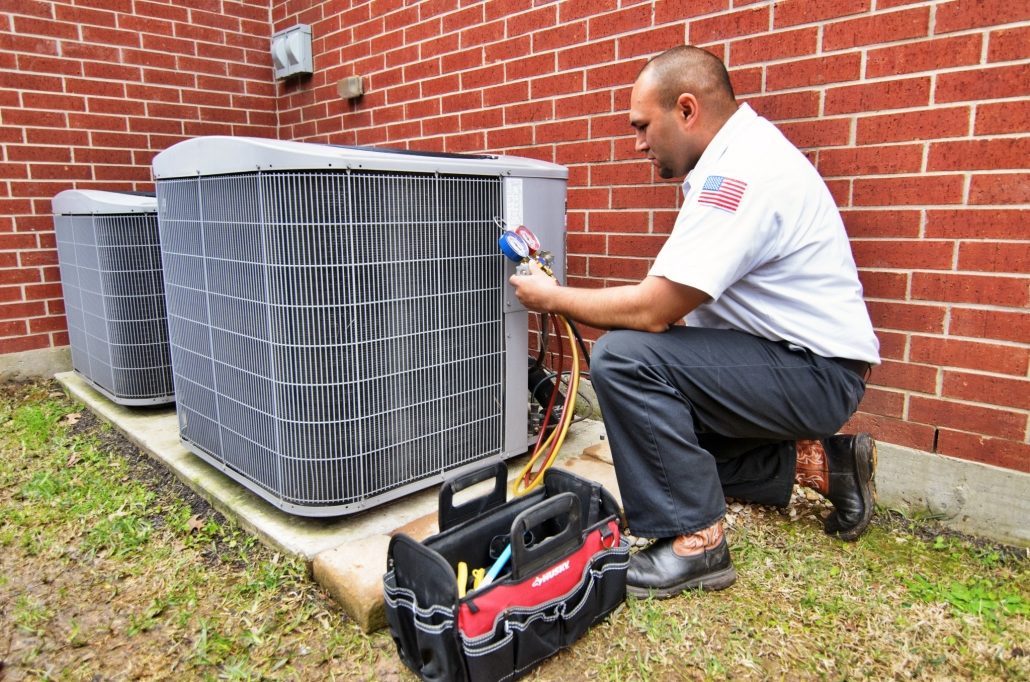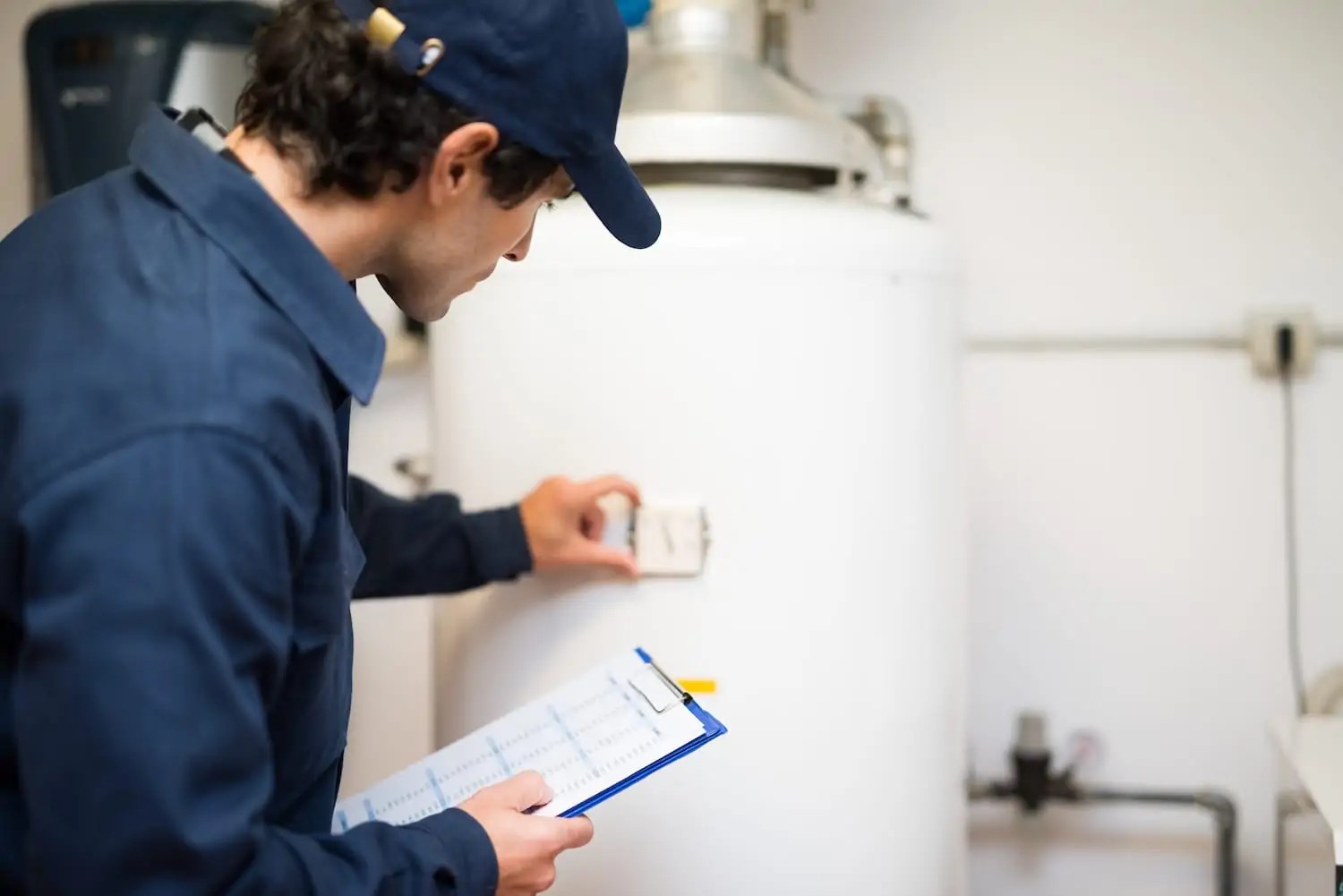5 Reasons You Have a Leaking Water Heater (and How to Fix It)
A leaking water heater isn’t a problem that should be ignored. If left unattended, it will only get worse. Eventually, a leaking water heater can turn into a full-fledged flood that damages your property and costs you a high clean-up bill.
In addition, a leaking water heater can lead to the formation of mold and mildew. This puts your health at serious risk as some mold spores are toxic.
To be able to fix a leaking water heater, the first step is to figure out the cause.
Making the right diagnosis can be tricky–there are many reasons why you might have water build up under your water heater.
The good news is we’ve put together this super easy-to-follow guide for identifying the cause behind your leaking water heater and getting it fixed.
#1. Don’t Mistake Condensation for Leaking Water Heater
If you see a puddle around your heater, your first thought may be that you have a leak on your hands.
However, before you start troubleshooting for a leaking water heater, take a close look to see if it isn’t actually a case of condensation. If it is, you’ll have to follow a different fixing procedure.
Water heaters produce moisture naturally as part of the process of heating water. They spill condensate if the temperature setting is too low, if you have an undersized gas heater, or if the weather causes very cold incoming water.
When you see water under your heater, clean it up. Turn the gas off using the control valve. Then, wait a few hours to see if the area is wet again.
If the area is dry after the time passes, then it was condensation. If you find a newly-formed puddle, you may have a case of leaking water heater on your hands.
#2. Leaking from the Inlet/Outlet Connections
Some leaking water heater fixes are easier than others. If the leak is coming from the cold water inlet and hot water outlet connections, you probably have no more than a loose connection on your hands.
In that case, all you have to do is tighten the inlet and outlet pipes at the top of the unit. You can do it in no more than a few seconds with a good quality pipe wrench.
#3. Leaking Temperature and Pressure Relief Valves
The temperature and pressure relief valve is a safety device on every water heater that lets water out of the tank if the temperature or pressure get too high. It runs into the floor.
Inspect the point where the temperature and pressure relief valve enters the tank. If you see water running down here, it means you either have a defective valve or the pressure is so strong it’s forcing the valve to open.
To determine whether your leaking water heater is caused by overheating or high pressure in the tank, lower the water temperature using the thermostat. Let the power and gas on so you can see if water still comes out. If the leak continues, turn everything off.
If the temperature and pressure check out, then the issue may be with the valve itself.
To check the condition of the valve, place a bucket underneath the discharge tube and open the temperature and pressure valve. Doing this flushes out debris that may be keeping the valve from working properly.
If flushing out the debris, doesn’t work, then you most likely have to replace the valve.
To replace, first drain the hot water tank, bringing the water level below the valve (you don’t have to drain the tank completely).
Next, let air in the tank by opening the faucet of your sink or bathtub. Use channel locks to grab the temperature and pressure relief valve; turn counter-clockwise until the valve comes off. Use the same channel locks to screw the new valve into place.
To finish up, refill the tank with your cold water supply. Once the tank is full, you can safely turn the power to your heater back on.
#4. Bottom-of-the-Tank Leakage
A common occurrence is to see water coming out of the bottom of a leaking water heater.
In this case, the safest course of action is to leave the heater alone and ask for assistance from a licensed plumbing or HVAC company.
Bottom-of-the-tank leakage indicates a serious problem with the tank’s internal mechanisms. Most likely, you’re going to have to replace your water heater.
Handling the internals of a water heater is very hazardous if you don’t know what you’re doing. That’s why it’s best to call a professional if you see this type of leakage.
#5. Leaking Water Heater: Drain Valve Issues
As with the temperature and pressure relief valve, the drain valve may be outdated or impeded by debris.
Open the valve by turning the dial counter counter-clockwise. Be sure to put a bucket underneath to catch the debris that gets flushed out.
If leaking continues after you’ve cleaned out the debris, check to see if it’s clogged. If everything is clear, you probably have to replace the drain valve.
If you don’t have a replacement on-hand, you can do a temporary fix by placing a brass hose end cap on the valve threads.
Continued Leakage
Keep observing the condition of your water heater after you’ve performed the repairs. Leaks after valves have been replaced may be indicative of a bigger problem with your water heater.
For safety, turn off the power and cold water supply of your water heater when making repairs. For electric water heaters, this means switching off the breaker. With natural gas heaters, use the on/off dial, but avoid closing the gas shut-off valve (these can stop working over time).
Conclusion
A leaking water heater should be taken care of right away. If you notice water under your unit, perform an inspection immediately to best determine the type of repair necessary.
Remember to check for condensation. If you find a leak, follow the steps outlined above to plug up the spilling.
Dealing with a leaking water heater can be difficult and time-consuming. Calling a licensed water heater specialist can make your life a lot easier.
Request Service

Why Choose Masters Heating & Cooling?
Northeast Indiana's HVAC & Plumbing Experts
- Licensed, insured & NATE-certified technicians
- Carrier Customer Specialist with experience servicing all brands
- Free estimates on replacement quotes
- Upfront pricing & financing options
- Background-checked technicians
- Military, veteran & senior discounts
- Serving Fort Wayne, Decatur, Greenwood & Indianapolis



